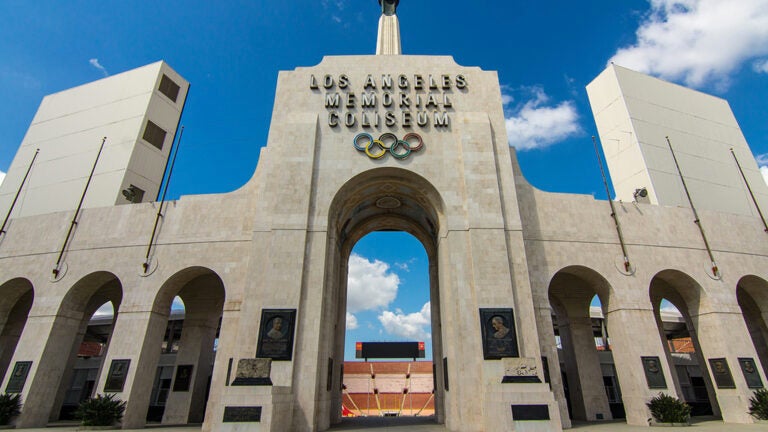
The historic peristyle is a signature of the Coliseum. (Photo/USC News file photo)
Coliseum meets ‘zero waste’ goal
USC-managed stadium is the largest in the NFL and the second-largest college field to achieve the remarkable goal, repurposing over 90 percent of waste created by over 1 million fans
When the Los Angeles Rams play the Arizona Cardinals at the Los Angeles Memorial Coliseum on Sunday, it will mark more than the last game of the season: Fans in attendance will be a part of a sustainability effort that will help push the stadium over the “zero waste” goal line.
In doing so, the Coliseum becomes the largest NFL stadium and second-largest college stadium to meet the high sustainability goal of zero waste.
This is an opportunity for USC Athletics and our fans to lead the way in terms of taking ownership of our environmental impact on game days.
Lynn Swann
“We’re proud to be a part of a program such as the Zero Waste Initiative at the Coliseum. This is an opportunity for USC Athletics and our fans to lead the way in terms of taking ownership of our environmental impact on game days,” said USC Athletic Director Lynn Swann. “Our university, fans and alumni should be proud of the success of this program.”
A team effort
It was no small feat for the venue to divert over 400,000 pounds of waste from over 1.2 million stadium guests to win the zero waste challenge. The initiative diverted enough waste from the landfill to fill nine 53-foot semi-tractor trailers, or the equivalent of the annual waste generated by 250 Californians.
To divert as much as possible from up to 21 tons of waste per game, the waste went through a triple-sort process, including source sorting (fans using the right bins), an on-site sort of the material (with a crew of 80-100 custodial and sustainability staff) and a off-site sort at the Athens Services waste collection and recycling service facility. The process generally took fewer than 48 hours, except on weekends where the stadium hosted both the Trojans and Rams and timeframes were condensed to as short as eight hours.
“The success of this program is another huge accomplishment for the Coliseum and its program sponsors who played a part in making this possible,” said Coliseum General Manager Joe Furin.
The Coliseum — jointly owned by the city, county and state — is managed by USC under a 99-year lease approved in 2014.
Increasing the challenge in 2016 was the Coliseum adding a major tenant in the Rams, who relocated from St. Louis and will play at the Coliseum until their new home in Inglewood is ready.
“A large part of making our communities a better place includes making as little an impact on the environment as possible,” said Molly Higgins, Los Angeles Rams vice president of community affairs and engagement. “We are pleased to work with USC, the Coliseum and our fans to make Rams games zero waste, which is good for all of Los Angeles now and into the future.”
What is zero waste?
Zero waste is defined as diverting 90 percent or more of waste materials from the landfill or incinerator, through recycling, composting or other repurposing. The 90 percent figure is considered the industry standard for a zero waste designation when accounting for variables like fans bringing in foreign, non-compostable products. Compostable, as opposed to biodegradable, products return valuable nutrients back into the earth as they disintegrate.
In collaboration with the USC Office of Sustainability, the Coliseum started moving its vendors to zero waste compliance before the 2015 USC Trojans college football season. USC has also been a member of the Green Sports Alliance since 2013, a nonprofit dedicated to helping sports leagues, teams, venues, partners and fans embrace healthy, sustainable practices.
“The progress that this program has made is an outstanding achievement and reflects the strong collaboration between all partners involved,” said Halli Bovia, manager of the USC Sustainability Program.
The zero waste accomplishment represents a massive success for the Coliseum, the USC Office of Sustainability, Legends Hospitality, ABM Janitorial Services and its other partners, and sponsors including Waxie, BASF, EcoSafe and Athens Services.
